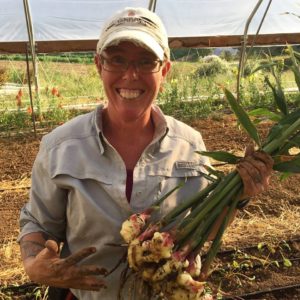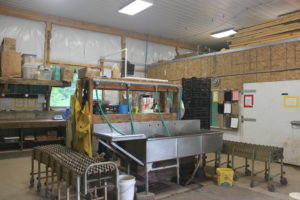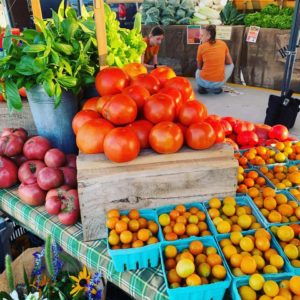
Liz Graznak is the owner and operator of Happy Hollow Farm in rural Moniteau County, Mo. Photo courtesy of Happy Hollow Farm.
By Jessica Claypole, FSA
Liz Graznak is the owner and operator of Happy Hollow Farm in rural Moniteau County, Missouri. Her priorities are to run an organic, sustainable, and community-supported farm. This is just a way of life for Liz, and her lifelong passion for plants helped pave the way.
Fresh Beginnings
“Growing up, I loved spending time with my grandmother in her garden and flower beds,” Liz said.
Her interest in sustainable community-supported agriculture was peaked during her years as a graduate student at Cornell University, when she joined a CSA not as a producer, but as a consumer.
“I had never really thought about where food came from,” Liz said. “I had no idea people actually got their food that way.”
After finishing graduate school, Liz put her master’s degree in plant breeding to good use, working on farms from the East Coast through the Midwest before returning home to Missouri to start her own operation.
From the Ground Up
Happy Hollow Farm is a USDA-certified organic operation that employs two full-time, one full-time seasonal, and four part-time employees, in addition to Liz. Visitors to the farm are treated to a truly unique experience, from the free-range chickens to the high tunnels filled with vegetables and flowers, to the barn outfitted with solar panels and a cold storage unit. Liz has built the operation from the ground up–literally.

Graznak used FSA’s Farm Storage Facility Loan program to add cold storage to her operation.
“The farm is just over 80 acres, and when we bought it in 2007, there was nothing here,” Liz added.
Working through her local USDA Service Center, Liz was able to implement a variety of programs into her operation to build it to what it is today. Through the Farm Service Agency, she used the Farm Storage Facility Loan program to add a cold storage unit to her existing barn, providing added value and space for her produce. These loans provide low-interest financing for producers to build or upgrade storage facilities.
She also participated in the Organic Certification Cost Share Program, which reimburses organic producers for a portion of their paid certification costs.
Liz worked with the local office of USDA’s Natural Resources Conservation Service for technical and financial assistance through the Environmental Quality Incentives Program to install high tunnels as well as plant pollinator habitats and cover crop mixes on her farm.
High tunnels are an installed structure that can extend the growing season for in-ground crops, allow farmers to grow crops that would traditionally not be suitable for a specific region, and provide added benefits for conserving water and soil.
Pollinator plantings consist of native grasses and wildflowers and provide habitat for bees, butterflies and other crucial pollinators, which pollinate crops and can draw beneficial bugs.
Cover crops are a mix of nitrogen-fixing plants that can help farmers prevent erosion, improve organic matter in soil, supply nutrients, suppress weeds, and improve the retention of moisture.
All of the energy used on the farm is produced by solar panels on her barn, which was made possible through Rural Development.

Graznak markets her produce, flowers, and eggs at the farmers market, sells wholesale, and to local restaurants. Photo courtesy of Happy Hollow Farm.
“Every chance I get, I tell people to participate in these USDA programs,” Liz said. “There were multiple programs I wanted to apply for, so I just worked with my local office to prioritize and implement, and I encourage others to do the same.”
Community Supported
Today, seven acres of the farm are devoted solely to vegetable production, which includes squash, tomatoes, and variety of greens, including kale, chard, and arugula. Liz markets her produce, flowers, and eggs at the farmers market, sells wholesale, and to local restaurants. Consumers can also enjoy the fruits of her labor by becoming a member of Happy Hollow Farm CSA, which currently serves more than 60 customers.
More Information
USDA offers a variety of risk management, disaster assistance, loan, and conservation programs to help agricultural producers in the United States weather ups and downs in the market and recover from natural disasters as well as invest in improvements to their operations. Learn about additional programs.
For more information about USDA programs and services, contact your local USDA service center.
For the digital version of this blog, visit #FridaysOnTheFarm.





